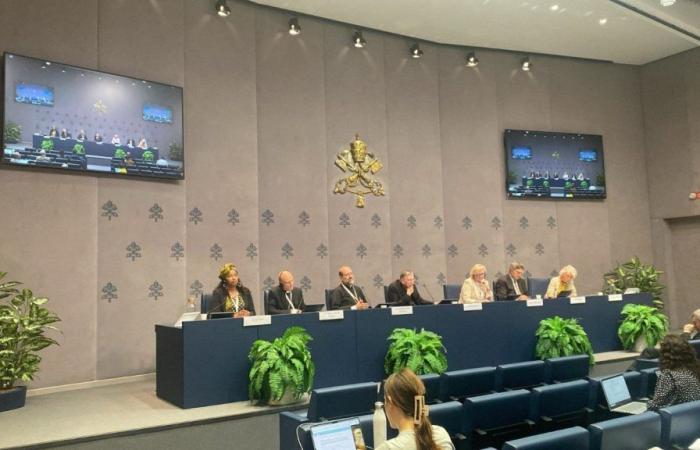The press conference this Thursday, October 10 on the work of the assembly on synodality focused on the theme of Christian unity. Cardinal Koch, Orthodox Metropolitan Job, Anglican Bishop Warner and Mennonite Pastor Graber were guests at the meeting. Tomorrow, an ecumenical vigil with the Taizé community will take place at the Vatican.
Roberto Paglialonga and Lorena Leonardi – Vatican City
Encouraging creativity and “overflow» – «overflow» in Spanish – reached the members of the Synod this Thursday morning from the special rapporteur, Father Giacomo Costa, on instructions from the general secretariat. This was announced by Paolo Ruffini, prefect of the Dicastery for Communication and president of the Information Commission of the Synod, who spoke this Thursday, October 10 at the Press Room of the Holy See, accompanied by Sheila Peres, secretary of the same Commission, during the traditional press briefing, moderated by the vice-director of the Holy See Press Room, Cristiane Murray.
Closing reports submitted by the circles
The work of the Synod this Thursday morning, in which 342 members participated, took place exclusively within the minor circles, without free interventions, and the conclusive reports of the second work module were submitted. Furthermore, emphasized Paolo Ruffini, “some methodological indications» were given at the opening, with a “encouragement of creativity and “overflow”“. A word, recalls the prefect of the Dicastery, used in the Spanish language “desborde”, and which corresponds to that “used by the Pope in Querida Amazonia» and also by Francis himself addressed to the “work of the Synod on the Amazon in 2019“. The wish, reports Paolo Ruffini, is therefore that there is a “overflow» always bigger, an overflow «rooted in deep restlessness, in keen desire».
The afternoon continued with the work of sharing and discernment on the third module of theInstrument of Laborthe section “Paths», illustrated by Sheila Peres in her speech, preceded by the moment of prayer and meditation from the Dominican Timothy Radcliffe, future cardinal, and the introduction to the module by Cardinal Jean-Claude Hollerich, general rapporteur.
A mutual exchange of gifts
The press conference focused on ecumenism, an element that forms an inseparable couple with synodality. To the point that Cardinal Kurt Koch, prefect of the Dicastery for Promoting Christian Unity, summarizes: “The synodal path is ecumenical. And the ecumenical path can only be synodal“. Defining the ecumenical dimension as “one of the most important aspects of this Synod“, the cardinal specifies how fundamental it is, both in the synodal component and in the ecumenical component, “the exchange of gifts, in which we learn from each other, in the conviction that no Church is so rich as not to need the contribution of other Churches and that none is so poor not being able to offer anything».
Holiness is the surest path to unity
The Prefect took this opportunity to emphasize that the presence of fraternal delegates is more significant at this session than at the previous one and ensured their participation in the ecumenical vigil planned for this Friday, October 11, in collaboration with Taizé. Two conciliar texts whose 60th anniversary will inspire prayer: the dogmatic constitution Light of the Gentiles and the decree on ecumenism Reintegration of the unit. The location chosen for this meeting which attracts representatives of different Christian denominations – the square of the Protomartiri Romani (Roman protomartyrs, editor’s note) – in the Vatican is not accidental: “It is here that tradition places the martyrdom of Peter. To remind us, Cardinal Koch concludes, that holiness is the surest path to unity».
In dialogue, no “compromise” but foundations for Christian unity
The first of three fraternal delegates to the conference His Eminence Job, Metropolitan of Pisidia and co-president of the International Joint Commission for Theological Dialogue between the Catholic Church and the Orthodox Church, then spoke in French. On issues such as primacy, synodality, ministries and conciliarity, dialogue between Orthodox and Catholics – he said – “is a bilateral dialogue which has continued for 20 years with benefit, not only to bring us closer and reconcile us, but also because it can bear fruit in the internal life of each Church».
In this regard, the Metropolitan referred to the recent document of the Dicastery for Promoting Christian Unity, “The Bishop of Rome“: what struck him in this publication, he reveals, “it is the convergence of all these dialogues. This means that we are not only looking for a “compromise” between the Churches, but that we are laying the foundations for a common life in Christian unity.».
A protected space where we open our hearts to each other
His Excellency Martin Warner, Bishop of Chichester and Co-Chair of the “English-Welsh Anglican-Roman Catholic Committee», focuses on the value of relational experience, which constitutes the main difference with the synods of the English Church. Since the Anglican primate of the time, Michael Ramsey, received the episcopal ring from Paul VI, he notes, “we can look at each other, recognize differences but also the importance of exchanging gifts in order to grow in our respective experiences“. Unlike Anglican synodal sessions, Catholic synodal sessions are characterized by prayer and silence, and above all “are not legislative»: this, according to Bishop Warner, guarantees “a protected space, where we can open our hearts to each other, in the conversation of the Spirit, to look with creativity and courage at the challenges of this century».
Every voice counts
Finally, Reverend Anne-Cathy Graber, pastor of the Mennonite World Conference and secretary for ecumenical relations, present for the first time at the Synod, said:surprised by the invitation“, because it belongs to a Church “little known», resulting from the Reformation of the 16th century and characterized by the baptism of believers and active non-violence. “The Catholic Church does not need our voice, which is very much in the minority, but it says a lot about synodality, it shows that every voice counts, that every voice is important».
Anne-Cathy Graber, Mennonite pastor: “At the synod, every voice counts.”
For Pastor Graber, “Christian unity is not only the promise of tomorrow, it is here and now, we can already see it. We are not only neighbors, we belong to the same body of Christ, we are members of one another, as Saint Paul said“. Although deprived of the right to vote as fraternal delegates, “our voice and our presence were welcomed like those of everyone else“. The equal dignity of baptism is visible. There is no powerful Church that rules from above. “We are all a people who walk and seek together».
Ecumenism is not in crisis
The issues session addresses in particular the themes of relationships within ecumenical dialogue and between the primacy of the Bishop of Rome and synodality. This, explained Cardinal Koch, “shows that there is no crisis in ecumenism, but several challenges it faces“. It is true, he continued, responding to the press, that “there is a sad situation, provoked also by the words of the Patriarch of Moscow and head of the Russian Orthodox Church Kirill, which caused a break with Constantinople, but it is necessary to distinguish these positions from the current path“. Indeed, he recalls, “there is a joint commission, in which 15 Orthodox Churches participate, which continues its work: this means that the dialogue continues in the hope of creating a better future, also in the hope of preparing together a plenary assembly».
The importance of small gestures
An assurance also underlined by the Metropolitan of Pisidia: “The Church of Christ remains on the ground, despite the political positions expressed by Kirill, because theological dialogue continues to lay solid foundations“, he declares. “The current movement is a movement, there is no pause in our journey,” adds Cardinal Koch: “The ecumenical movement is achieved precisely by walking together, by praying together, by collaborating together“. Jesus himself, he concludes on this point, does not command the unity of Christians, but prays for it: what can we do better, if not pray for it to be realized as a gift from Holy Spirit? Maybe “what we expect“, said Pastor Graber, these are “small symbolic gestures of reconciliation, which are still lacking».
Regarding the relationship between Petrine primacy and synodality, Cardinal Koch clarified that “we can affirm that synodality and primacy are not in opposition, on the contrary: one does not exist without the other and vice versa”, adding that “primacy is not an opposition, but an opportunity to discuss and find a meeting point».
Hospitality of the sacraments, a question to explore further
As for the question of hospitality of the sacraments, it was recalled that the Pope has set up a special working group, and that “there is not yet the same level of vision of the Church and of sacraments in the dialogue between the Western Churches. It is hoped, said Metropolitan Job, “to be able to arrive at a single date for Easter between Christians and Orthodox, but for the moment it is only a wish».
Regarding the so-called female ministries, the prefect of the Dicastery for the Promotion of Christian Unity emphasized “the delicacy of the subject, on which the Pope has created ten working groups, but on which the Dicastery for the Doctrine of the Faith has also been working for some time: two study commissions have not reached an unequivocal conclusion, a sign that it is necessary to explore the issue further. It is therefore important here to combine the passion for questions with the patience for study», concluded the cardinal.






